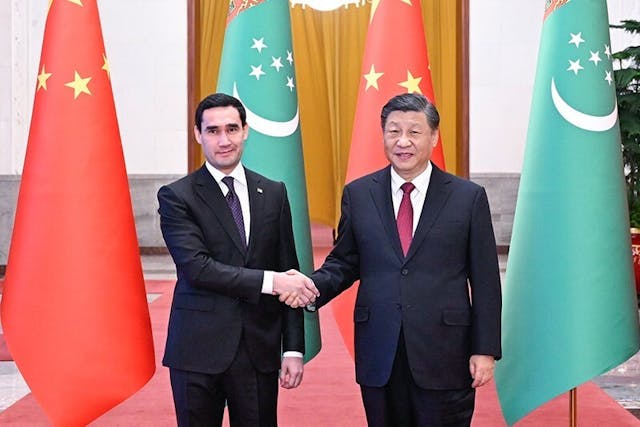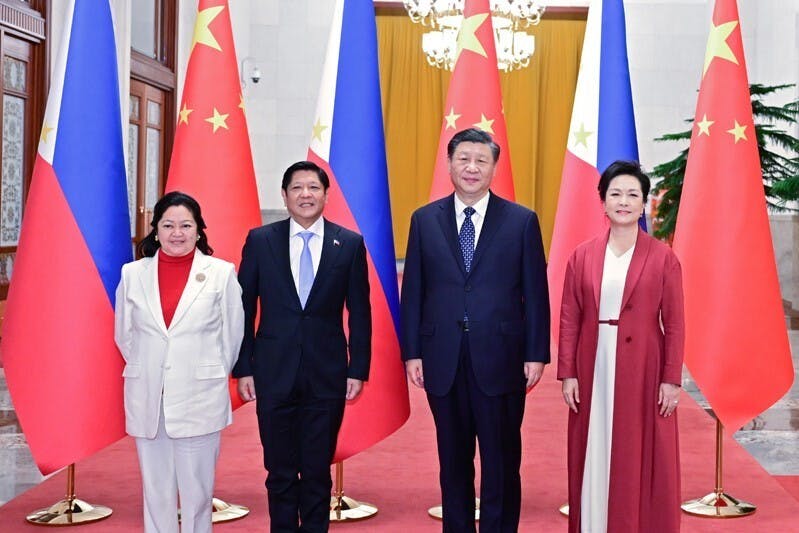中國國家主席習近平最近與菲律賓總統小馬可斯和土庫曼總統別爾德穆哈梅多夫的會晤,對中國倡議的「一帶一路」和外交政策具有重要意義。 顯然,中國希望通過強調共同戰略利益的重要性、實現可持續和雙贏的社會經濟和技術合作的共同目標,以及在以中華民族偉大復興及和平崛起為特徵的世界國際新秩序中維護和平的必要性,並與「一帶一路」沿線國家建立更緊密的關係。
小馬可斯總統於1月3日至6日為期3天的訪問在許多方面,具有政治和外交意義。
小馬可斯選擇務實 處理對中對美關係
首先,習近平主席1月4日會見馬可斯總統時強調,他是今年中方接待的首位外國領導人──表達了對馬可斯友好姿態的讚賞。習近平又說,中國和菲律賓有着悠久的歷史淵源,馬可斯的父親於1975年6月與中華人民共和國建立外交關係。習近平表示,馬可斯這次訪華不僅是一次「懷舊之旅」,更是一次「開創之旅」,令這位年輕的菲律賓總統想起1974年陪同母親艾美黛(Imelda Marcos)訪問中國時與毛澤東主席的會面。
第二,中菲奉行務實的經濟政策,雙方達成14項合作文件,涵蓋農業合作、教育交流、能源供應、環境保護、基礎建設項目、技術交流、雙邊貿易和人文交流等領域。習近平強調,中國正在全面推進鄉村振興、加快建設農業強國,願助力菲律賓農業農村發展,打造農技中心品牌項目。此外,雙方也將在電子商務、大數據、基礎設施建設以及石油和能源供應方面進行合作。最重要的是,中國企業將在菲律賓投資,雙方將在氣候變化和航空領域開展合作。隨着中國和菲律賓逐漸從新冠疫情的衝擊中恢復過來,兩國理所當然都渴望加強在各個領域的合作。
第三,馬可斯治下的菲律賓,外交策略有點像他的前任杜特爾特,對中國的友好程度超過已故總統阿基諾三世的反華立場。馬可斯不像阿基諾三世那樣反華,但也不像杜特爾特那麼反美。換句話說,馬可斯和他的中國事務顧問在已故阿基諾三世採取的反華取態與杜特爾特的反美立場之間取得了微妙的平衡。他的溫和做法往往更加務實、溫和、謹慎、經濟上明智、具政治策略,而外交上既不親美也不反華。
第四,雙方都希望擱置領土爭端,加快南海行為準則的討論進程,同時探討如何通過協調和協商以友好方式處理海上問題。 國務院總理李克強1月4日會見馬可斯時強調,要以務實的態度發展互信和合作共贏,以維護南海的和平穩定。全國人大常委會委員長栗戰書也強調,中菲意見分歧可以通過友好協調解決。對此,馬可斯表示,菲方歡迎更多中國遊客訪菲,歡迎更多中國企業到菲律賓投資。顯然,雙方都將實用主義視為淡化意見分歧和擱置任何領土爭端的最佳途徑。
第五,中菲在馬可斯訪華結束時達成聯合聲明,包括設立熱線電話處理南海突發爭端和危機,避免誤判和誤傳。聯合聲明中的一個重要內容是菲律賓的基礎建設項目,即橫跨帕西格─馬里基納河(Pasig-Marikina River)橋樑和芒加漢河(Manggahan Floodway)橋樑建設項目。看起來,中國對菲律賓的基礎設施項目支持不僅是雙方經濟務實主義的重要組成部分,也是「一帶一路」外交政策的標誌。

土庫曼看到中國的經濟胡蘿蔔
1月6日,土庫曼總統別爾德穆哈梅多夫訪問北京,雙方將兩國關係提升為全面戰略夥伴關係,在綠色能源、天然氣利用、物流鏈供應、技術轉移和踐行真正的多邊主義等領域開展合作,這也體現了中國「一帶一路」外交政策的務實主義特徵。
其次,中國企業會像中菲關係一樣,加大對土庫曼的投資。顯然,在中國的「一帶一路」外交政策中可以看到經濟方面的胡蘿蔔。
第三,習近平同別爾德穆哈梅多夫會談中強調了安全問題,包括深化執法安全、生物安全合作、共同打擊「三股勢力」(恐怖主義、分裂主義、極端主義)等工作。別爾德穆哈梅多夫表示,土庫曼支持中國維護國家主權和領土完整,堅決反對任何分裂中國的圖謀。安全合作在中土關係中顯得突出。
第四,雙方在可持續發展領域的合作,包括公共衛生合作、人文交流、新聞媒體領域合作。
第五,中國向土庫曼進行了技術轉移,以便土庫曼探索開發油氣供應。中國還以較低的利率向土庫曼提供貸款,以便開發和完成中亞國家的天然氣管道。中國對土庫曼的經濟援助和技術轉移具有戰略價值和利益,增進了兩國之間互信的紐帶。
第六,兩國發表聯合聲明,土庫曼重申台灣是中國不可分割的一部分,堅持一個中國原則,反對任何形式的台獨。
中國冀贏取 發展中國家的人心
總的來說,中國近期與菲律賓改善關係和加強與土庫曼的關係,顯示了「一帶一路」外交政策的明顯特徵。中國與菲律賓、土庫曼等「一帶一路」沿線國家在可持續發展、能源及天然氣勘探與供應、技術轉移、公共衛生交流、農業發展、安全合作、電子商務發展等領域開展經濟合作,體現務實精神,以及中國企業在這些國家的投資,傳達的信息很明確:中國的崛起和復興不會對世界構成威脅;相反,中國的崛起實際上是和平的,強調合作共贏,實現共同利益。
簽署「一帶一路」聯合聲明或合作文件的外交政策,旨在鞏固中國與「一帶一路」沿線國家之間現有的戰略關係。連同中國採取的強勢領導人外交,國家主席習近平親自會見了馬可斯和別爾德穆哈梅多夫,中國的「一帶一路」外交政策旨在贏得世界不同國家,特別是發展中國家的人心,相互尊重並給予他們高度的外交重視。因此,在敵對環境日益加劇、國際政治冷戰思維明顯的情況下,中國的多邊主義、和平形象和合作共贏,有望在精妙的外交策略和「一帶一路」倡議中牢牢樹立起來。
China’s new relations with the Philippines and Turkmenistan
The recent meetings between the Chinese President, Xi Jinping on the one side and the Philippines President Ferdinand R. Marcos Jr. and Turkmenistan President Serdar Berdimuhamedov on the other side have important implications for China’s Belt and Road initiatives and foreign policy. Clearly, China is keen to forge closer relations with countries along the Belt and Road by emphasizing the importance of mutual strategic interests, the common objectives of achieving sustainability and win-win socio-economic and technological cooperation, and the necessity of maintaining peace in a new world international order in which the Chinese renaissance and peaceful rise are the defining characteristics.
President Marcos’s three-day visit from January 3 to 6 was politically and diplomatically significant in many aspects.
First, President Xi Jinping who met him on January 4 emphasized that his visit was the first one made by a top political leader outside China – an expression of appreciation of the friendly gesture from Marcos. Xi added that China and the Philippines had a long-standing historical bond in which Marcos’s father had established diplomatic relations with the People’s Republic of China (PRC) in June 1975. President Xi remarked that President Marcos’s current trip symbolized both “a nostalgic” and “a path-breaking” visit, reminding the young Philippines President of his meeting with Chairman Mao Zedong in 1974 when he accompanied his mother Imelda to visit the PRC.
Second, both China and the Philippines are economically pragmatic and keen to reach 14 agreements that cover agricultural cooperation, educational exchange, energy supply, environmental protection, infrastructural development projects, technological exchange, bilateral trade and human interactions. President Xi stressed that China has rich experiences in agricultural development and that it can and will help the Philippines to develop its agriculture, including the processes of cultivation, manufacturing, additional processing, depositing and logistical supplies, and products branding. Furthermore, both sides can and will collaborate in e-commerce, big data, infrastructure development, and oil and energy supply. Most importantly, the Chinese enterprises will invest in the Philippines and both sides will cooperate in the areas of climate change and aviation. As China and the Philippines are gradually recovering from the onslaught of Covid-19, both countries are naturally eager to strengthen all areas of cooperation.
Third, the Philippines under Marcos is, a bit like his predecessor Rodrigo Duterte’s diplomacy, more friendly toward China than the anti-China position of the late President Benigno Aquino III. Ferdinand Marcos Jr. tends to be far less anti-China than Aquino and yet less anti-American than Duterte. In other words, Ferdinand Marcos Jr. and his China advisers are striking a fine balance between the anti-PRC approach adopted by the late Aquino III on the one hand and the anti-US stance of Duterte on the other. His moderate approach tends to be far more pragmatic, moderate, cautious, economically wise, politically strategic, and diplomatically neither pro-US nor anti-China.
Fourth, both sides are keen to put aside their territorial disputes and instead accelerate the process of discussing the code of conduct for the South China Sea, while simultaneously exploring how to deal with maritime issues in a friendly manner through coordination and discussion. The PRC Premier Li Keqiang who met Marcos on January 4 emphasized the development of mutual trust and win-win cooperation through a pragmatic approach to coping with peace and stability in the South China Sea. A similar emphasis was made by the chairman of the National People’s Congress, Li Zhanshu, who said that the Sino-Philippines opinion differences can be tackled through friendly coordination. In response, Marcos remarked that the Philippines welcome the visit from more Chinese tourists and the investment from more Chinese enterprises. Clearly, both sides see pragmatism as the best approach to diluting opinion differences and putting aside any territorial disputes.
Fifth, both sides reached a Joint Declaration at the end of the Marcos visit, including the establishment of a hotline to deal with any sudden dispute and crisis over the South China Sea for the sake of avoiding miscalculation and miscommunication. One important element of the Joint Declaration is the infrastructure projects in the Philippines, namely the priority bridges crossing Pasig-Marikina River and Manggahan Floodway Bridges Construction Project. It looks as if China’s infrastructure project support for the Philippines is not only a key ingredient of economic pragmatism for both sides, but also a hallmark of its Belt and Road foreign policy.
This feature of pragmatism in China’s Belt and Road foreign policy can also be seen in the visit of Turkmenistan President Serdar Berdimuhamedov to Beijing on January 6, during which both sides elevated their relations to a comprehensive strategic partnership with cooperation in green energy, natural gas utilization, logistic chain supply, technology transfer and the emphasis in multilateralism.
Second, the Chinese enterprises, like the case of China’s relations with the Philippines, will invest more in Turkmenistan. Clearly economic carrots can be seen in the PRC’s Belt and Road foreign policy.
Third, security issues have been emphasized in President Xi’s discussions with Berdimuhamedov, including the deepening work in security implementation, biological safety cooperation, and the combat against “three forces” (terrorism, separatism and extremism). Berdimuhamedov said Turkmenistan supports China in safeguarding its sovereignty and territorial integrity, and his country resolutely opposes any attempt to divide China. Security cooperation is prominent in China’s relations with Turkmenistan.
Fourth, both sides cooperate in the realm of sustainable development, including public health collaboration, human interactions, media exchange,
Fifth, technology transfer from China to Turkmenistan has been made so that the latter can explore the development of gas and oil supply. Chinese loans were also made with cheaper interest rate to Turkmenistan so that the natural gas pipes of the central Asian state can be developed and completed. Economic aid and technology transfer from China to Turkmenistan had strategic value and interests, building up the mutual trusts and bonds between the two countries.
Sixth, in a joint statement, Turkmenistan reiterated that Taiwan is an inalienable part of China, and that it upholds the one-China principle and opposes “Taiwan independence” of any form.
In conclusion, China’s recently improved relations with the Philippines and enhanced relations with Turkmenistan show the defining features of its Belt and Road foreign policy. Pragmatism prevails in China’s economic cooperation with the Belt and Road countries, like the Philippines and Turkmenistan, including the areas of sustainable development, energy and gas exploration and supply, technology transfer, public health exchange, agricultural development, security collaboration, e-commerce development, and the investment of Chinese enterprises in these countries. The message is clear: China’s rise and its renaissance do not constitute any threat to the world; instead, the rise of China is actually peaceful, and it emphasizes the win-win cooperation with the achievement of mutual and common interests. The signing of Joint Declaration or Agreement in China’s Belt and Road foreign policy aims at consolidating the existing strategic relations between the PRC and its neighbouring states along the Belt and Road. Together with the assertive presidential diplomacy adopted by China, whose President Xi Jinping himself has met Ferdinand Marcos Jr. and Serdar Berdimuhamedov, China’s Belt and Road foreign policy aims at winning the hearts and minds of different countries in the world, especially those developing ones, with mutual respect and high level of diplomatic importance accorded to them. As such, China’s multilateralism, peaceful image and win-win cooperation can hopefully be firmly established in the finesse of Chinese diplomacy and Belt and Road initiatives amid an increasingly hostile environment and an obviously Cold War mentality of international politics.
原刊於澳門新聞通訊社(MNA)網站,本社獲作者授權轉載。網址:https://www.macaubusiness.com/opinion-chinas-new-relations-with-the-philippines-and-turkmenistan/


































